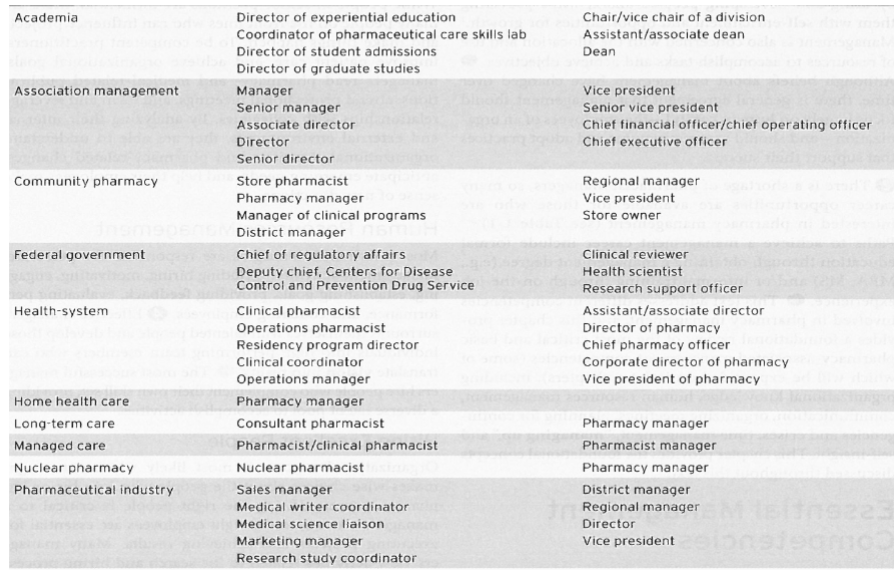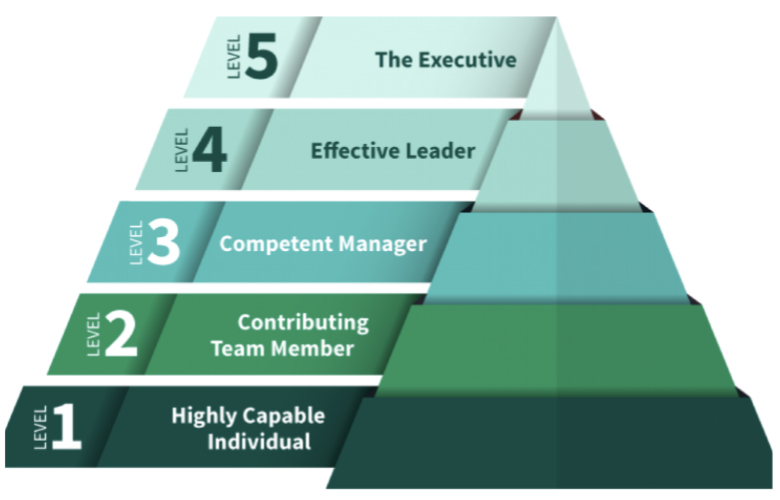01 Basics
1/20
There's no tags or description
Looks like no tags are added yet.
Name | Mastery | Learn | Test | Matching | Spaced |
|---|
No study sessions yet.
21 Terms
Define management
Process that brings together resources and unites them in a way that collectively achieves goals or objectives in the most efficient manner possible
Modern Definition: Process that brings together resources and unites them in a way that collectively achieves goals or objectives in the most efficient manner possible
should focus on human capital
develop skills in workforce
build confidence in staff abilities
engage staff and encourage involvement in appropriate aspects of pharmacy operation
Managerial Sciences include…. (7) (HAF(ta) MOVE )
Human Resource Management
Accounting
Finance
Marketing
Operations Management
Value Creation
Economics
list some management opportunities for pharmacists:
Manage patients: ensure pt experience is optimal, provide pt care services to improve care, develop strategies to meet pt needs
Manage employees/colleagues: ensure staff has everything they need to be successful, develop strategies to improve targeted outcomes, lead the team (maximizing human capital)

Describe the effect modernization of the profession has had on
pharmacy management
managers get limited training
limited/poor training → learning bad management strategies, never taught alternative approaches, create toxic environment, inability of managers to have growth
staff pharmacists/employees are disengaging
Often starts as an intern/tech/extern
- Lack of mentor/management encouraging engagement
- Lack commitment to ensuring positive perspectives of employees
Cite common traits of an effective leader and manager
Beyond traditional management concepts
Manage patients
Ensure the patient experience is optimal
Provide patient care services to improve care (possibly)
Develop strategies to meet patient needs
Manage employees/colleagues
Ensure staff has everything they need to be successful
Develop strategies to improve targeted outcomes
“Lead” your pharmacy team
What is the goal of pharmacy leadership?
Maximizing human capital
motivating and engaging employees
in larger corps….
pharmacists feel that they have little voice
defer to “corporate” leadership
less independence
increases importance of managing motivation
personally
colleagues/employees
Differentiate between leadership and management: What makes a pharmacists/pharmacy manager a good leader?
You will need to combine your clinical knowledge, business acumen, and
interpersonal skills. There are many different skills, including the ability to:
Motivate and engage others
Establish performance standards
Provide valuable feedback/goals
Communicate
Negotiate
Solve problems and manage conflicts
What is leadership?
Ability to mobilize and inspire others
Process of influence to accomplish a common task
The effectiveness of a leader is determined by the level of
influence and outcomes of the decisions
Differentiate between leadership and management
Primary Focus of management: operational (doing things right)
Implementing organizational programs
Developing and managing workflow
Hiring new employees and addressing day-to-day issues to motivate
and engage staff
Primary Focus of leadership: ensure broad mission and vision are achieved (doing the right things)
Max potential of each team member
Empower others
Foster an atmosphere of teamwork to achieve organizational goals
What is the Expectancy Theory?
Individuals are motivated to perform if they know that their extra performance is recognized and rewarded
evaluate expectancy, valence, and instrumentality of different activities they perform
Expectancy: perceived likelihood that expending effort will lead to goal attainment
instrumentality: perceived likelihood that goal attainment will lead to desired outcomes
valence: desirability, attractiveness, importance, or anticipated satisfaction with outcomes associated with a goal
What is Emotional Intelligence?
ability to assess and manage your emotions and the emotions of others is critical
know how to express emotions appropriately
limit expression when it is more beneficial
read the room
understand other’s emotions
properly respond those emotional needs
Importance of emotional intelligence as a pharmacy manager?
pharmacy manager needs to balance of traditional and emotional intelligence
Traditional intelligence contributes to problem-solving and analytical thinking.
Emotional intelligence, including self-awareness, empathy, and the ability to manage personal and professional relationships, is also important
Describe “Collins’s hierarchy of leadership”
Level 1: highly capable individual
Level 2: Contributing team member
Level 3: Competent Mangager
Level 4: Effective Leader
Level 5: Executive

Describe Level 1 of “Collins’s hierarchy of leadership”
Highly Capable Individual: talent, knowledge, skills, good habits
Describe Level 2 of “Collins’s hierarchy of leadership”
Contributing Team Member: Achieve of group objectives and work effectively with others
Describe Level 3 of “Collins’s hierarchy of leadership”
Competent Manager: Efficiently and effectively organize resources and people to achieve predefined objectives
Describe Level 4 of “Collins’s hierarchy of leadership”
Effective Leader: Goes beyond managing resources and looks to inspire and motivate people towards a common vision
Describe Level 5 of “Collins’s hierarchy of leadership”
Executive: Combines the capabilities of levels 1-5 displaying humility and professional will
Describe different leadership styles (5)
Affiliative - relationship and team building
Autocratic - Independent decision making
Democratic - Facilitate input from members of org
Laissez-faire - provide resources, but little direction
Transformational - use societal and spiritual values to bolster performance and motivation
Servant - meet needs of those they lead and help them grow
Evaluating different leadership and management styles based on various pharmacy-specific scenarios
management/leadership position
Specific styles may work better
Most employers do not dictate a specific leadership style for managers
Mastering multiple styles will allow you to shift as necessary
employee position
Understanding your mentors/leader's style will help…
better understand how to interact with the manager
how to best engage as team member
Assess individual roles in developing management strategies: Developing your leadership potential
Pursue leadership roles within community organizations
Volunteer for leadership roles within professional organizations
Find one or more mentors
Ask for difficult assignments
Stay informed
Observe others
Read about leaders
Take leadership tests and inventories
Develop emotional intelligence
Do not wait to be ready